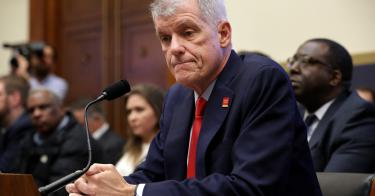In a recent House Financial Services Committee hearing, Rep. Alexandria Ocasio-Cortez (D-N.Y.) blasted Wells Fargo CEO Tim Sloan. That she would attack Sloan was no surprise, but her specific line of questioning was.
“Why was the bank involved in the caging of children and financing the caging of children to begin with?,” the freshman congresswoman demanded, apparently referencing the fact that Wells once lent money to a company than runs immigration detention facilities.
Ocasio-Cortez also suggested that Wells should be liable for any environmental damage involving projects the bank helps finance. “Hypothetically,” she asked, “if there was a leak from the Dakota Access pipeline, why shouldn't Wells Fargo pay for the cleanup of it, since they paid for the construction of the pipeline itself?”
One could easily dismiss Ocasio-Cortez version of liability as nonsense. After all, where would her logic end? Should the people who deposited money with Wells Fargo be liable, too? Perhaps the companies where those individuals earned their money?
Ocasio-Cortez used the hearing room as a stage for her political theater. Unwittingly, though, she helped draw attention to a serious problem: Banks are already on the verge of being nationalized to fulfill the vision of politicians like Ocasio-Cortez.
Long before the 2008 financial crisis, banks were heavily regulated and tightly entwined with the federal government. Federal regulations dictated complex capital rules, from how to define types of capital to how much was required. The sea of rules helped turn banking into a less-than exciting profession, with most bank balance sheets looking very similar.
Other federal rules heavily influenced what types of loans banks could make, and to whom. The Community Reinvestment Act is one well-known example, but more mundane regulations dictate things such as the maximum that can be lent to any single customer and overall concentrations of credit with types of customers.
Federal anti-money laundering rules effectively turned banks into an extension of law enforcement, practically criminalizing the use of all but nominal sums of cash. And federal law has long been geared toward ensuring that all banks charge the same price to anyone in their market, further driving the standardization of the banking business. Regulators can remove a bank’s board members, and can even prevent banks from dealing with customers based on ill-defined concepts such as “reputational risk.”
This situation prevails primarily because banks made a tradeoff: They accepted a pervasive regulatory framework in return for government backing, whether through deposit insurance, or some other type of federal funding.
The post-2008 regulatory framework doubled down on these trends.
Banks have now accepted the notion that they should work with the federal government to minimize systemic risk and to maintain financial stability. They do not want a repeal of the Dodd-Frank Act, the Community Reinvestment Act, the Truth In Lending Act, or any of the countless other Acts that mandate rules. They’re fine with tailored rules, but they still want the rules.
After the crash, everyone from law professors to cable TV pundits started openly pushing the idea that banks should be formally turned into public utilities.
The basic idea is that banks serve a public purpose. As such, the federal government should regulate banks’ rate of return, protect customers from excessive prices and fees, and ensure that everyone has “access” to credit and the payments system. Banks should be publicly governed and used to implement any number of social goals, such as reducing income inequality.
As outlandish as this approach might seem, banks already operate in a utility-like environment, and it will be much easier for Congress to continue moving further in this direction than to reverse course.
It’s clear that some have already caught on. Recently, Karen Shaw Petrou, dubbed by American Banker as “the sharpest mind analyzing banking policy today – maybe ever,” penned an opinion piece titled “Bank Regulators Aren't Doing Enough To Address Economic Inequality.”
It doesn’t take much imagination to picture a federal agency blocking the financing of a massive energy project — or any other private venture — that one political class dislikes.
If banks want to remain a critical part of the free enterprise system for centuries to come, they will have to forgo their tradeoff. They will have to compete with new financial firms that change the financial landscape. Regulated utilities cannot pull this off.
This piece originally appeared in Real Clear Policy



